De Duitse dichteres en schrijfster Marie Luise Kaschnitz werd geboren op 31 januari 1901 in Karlsruhe. Zie ook alle tags voor Marie Luise Kaschnitz op dit blog.
Nicht gesagt
Was von der Sonne zu sagen gewesen wäre
Und vom Blitz nicht das einzige Richtige
Geschweige denn von der Liebe.
Versuche. Gesuche. Mißlungen
Ungenaue Beschreibung
Weggelassen das Morgenrot
Nicht gesprochen vom Sämann
Und nur am Rande vermerkt
Den Hahnenfuß und das Veilchen.
Euch nicht den Rücken gestärkt
Mit ewiger Seligkeit
Den Verfall nicht geleugnet
Und nicht die Verzweiflung
Den Teufel nicht an die Wand
Weil ich nicht an ihn glaube
Gott nicht gelobt
Aber wer bin ich daß
Bräutigam Froschkönig
Wie häßlich ist
Dein Bräutigam
Jungfrau Leben
Eine Rüsselmaske sein Antlitz
Eine Patronentasche sein Gürtel
Ein Flammenwerfer
Seine Hand
Dein Bräutigam Froschkönig
Fährt mit Dir
(Ein Rad fleigt hierhin, eins dorthin)
Über die Häuser der Toten
Zwischen zwei
Weltuntergängen
Preßt er sich
In Deinen Schoß
Im Dunkeln nur
Ertastest Du
Sein feuchtes Haar
Im Morgengrauen
Nur im
Morgengrauen
Nur im
Erblickst Du seine
Traurigen
Schönen
Augen.
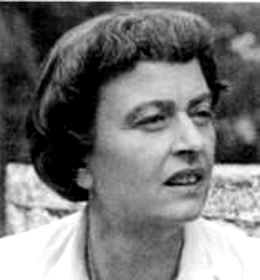
Marie Luise Kaschnitz (31 januari 1901 – 10 oktober 1974)
De Franse schrijfster Benoîte Groult werd geboren op 31 januari 1920 in Parijs. Zie ook alle tags voor Benoîte Groult op dit blog.
Uit: Les Vaisseaux du Coeur
“J’étais convaincue en commençant cette décennie là qu’elle serait la plus définitive et la plus riche de mon existence. En la finissant, je m’aperçu avec émerveillement que je pouvais encore repartir de zéro et avec stupeur que sur mes « dix plus belles années », j’en avais passé cinq à être malheureuse. C’était beaucoup trop et je m’en suis longtemps voulu d’avoir ainsi stagné dans la déréliction. Mais il faut bien faire l’expérience du malheur un jour ou l’autre et sans doute est-ce à 25 ans qu’on peut l’affronter sans dégâts irréparables. Je suis, hélas, une personne à la fois dénuée d’amour-propre et douée d’une grande tolérance au malheur : j’ai donc mis des années avant de trouver mon état conjugal insupportable et, ce qui est plus grave, nocif… Le jour où je me rendis compte que je n’avais pas regardé d’autre homme en cinq ans que celui précisément qui me faisait souffrir, état d’esprit dont l’extrême banalité ne semble pas décourager les victimes, féminines en particulier, la délivrance fut fulgurante et la convalescence délectable… Le jour ou mon malheur emprunta la forme précise d’une metteuse en scène qui l’accompagnait depuis des années dans ses déplacements professionnels, la lumière se fit et mon soulagement fut si vif que cette épouse humble et crédule que j’avais été me devint en peu de jours une étrangère… Nous avons divorcé sans trop de casse, aux torts réciproques, « l’enfant étant confié à sa mère en raison de son jeune age », formule lénifiante qui ménage l’amour propre des pères, dont la plupart à cette époque auraient considéré comme une catastrophe de se retrouver « libres » avec un enfant sur les bras.”

Benoîte Groult (Parijs, 31 januari 1920)
De Japanse schrijver Kenzaburo Oe werd op 31 januari 1935 geboren in het dorp Oso op het eiland Shikoku. Zie ook alle tags voor Kenzaburo Oe op dit blog.
Uit: Prize Stock (Vertaald door John Nathan)
“Hey! Have you heard?” he shouted, slamming me on the shoulder.
“Have you?”
“Heard?” I said vaguely.
“That plane yesterday crashed in the hills last night. And they’re looking for the enemy soldiers that were in it, the adults have all gone hunting in the hills with their guns!”
“Will they shoot the enemy soldiers?” my brother asked shrilly.
“They won’t shoot, they don’t have much ammunition,” Harelip explained obligingly, “They aim to catch them!”
“What do you think happened to the plane?” I said.
“It got stuck in the fir trees and came apart,” Harelip said quickly, his eyes flashing. “The mailman saw it, you know those trees.”
I did, fir blossoms like grass tassles would be in bloom in those woods now. And at the end of summer, fir cones shaped like wild bird eggs would replace the tassles, and we would collect them to use as weapons. At dusk then and at dawn, with a sudden rude clatter, the dark brown bullets would be fired into the walls of the storehouse. . . .
“Do you know the woods I mean?”
“Sure I do. Want to go?”

Kenzaburo Oe (Oso, 31 januari 1935)
De Zwitserse dichter en schrijver Kurt Marti werd geboren op 31 januari 1921 in Bern. Zie ook alle tags voor Kurt Marti op dit blog.
Jezus
1
met een schaar vrienden (vriendinnen ook)
door de dorpen en steden van galilea trekkend
genas hij zieken en vertelde hij verhalen
over de hartstocht van de god der eeuwen voor de wereld
2
voorrechten van de betere standen betekekenden niets voor hem
dagelijks ging hij om met dagloners en tollenaars
als ergens gebrek aan voedsel of drank was
deelde hij vissen uit en brood en wijn aan velen
3
geweld van machthebbers verachtte hij
geweldlozen heeft hij de aarde beloofd
zijn thema: gods toekomst op aarde
het einde van de macht van mensen over mensen
4
in een patriarchale wereld bleef hij de zoon
en een verdediger van onmondige vrouwen en kinderen
wilden galileeërs hem zelf tot koning verheffen? hij echter
ging op naar jeruzalem: recht in de val van zijn tegenstanders
Vertaald door Piet Thomas
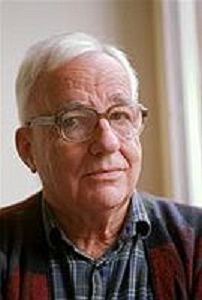
Kurt Marti (Bern, 31 januari 1921)
De Amerikaanse schrijver John ‘O Hara werd geboren op 31 januari 1905 in Pottsville, Pennsylvania. Zie ook alle tags voor John ‘O Hara op dit blog.
Uit: Appointment in Samarra
“The “coal and iron” police in the anthracite region have been so unimportant since the unionization of the mines that they seldom are mentioned. A candidate for governor of Pennsylvania cannot be elected without the support of the U.M.W.A., and the Pennsylvania State Police never are called “black Cossacks” in the anthracite region. A candidate for any political office in the anthracite counties would not think of having anything printed without getting the typesetters’ union label on his cards and billboards. The union is responsible for the Pennsylvania mining laws, which are the best in the world (although not yet the best there could be), and labor conditions, so far as labor strife was concerned, were all right in 1930, and had been all right since the disastrous strike of 1925. At that time the union called a strike which lasted 110 days, the longest strike in anthracite history. There was no violence beyond the small squabble, and there was no starvation among the miners. But anthracite markets disappeared. Domestic sales were hurt permanently; the oil burner was installed in thousands of homes. Anthracite is practically smokeless, and was satisfactory to its home owners, but they could not get anthracite during the strike, and when the oil burner was installed there was no point going back to coal. And so, as a result of the 1925 strike, the anthracite industry went back to work without nearly the demand for the product that there had been when the strike was called 110 days before. There had been another long strike in 1922, and the two strikes taught consumers that the industry was not dependable. The feeling was that any time the union felt like it, it would call a strike, shutting off the supply of anthracite.”
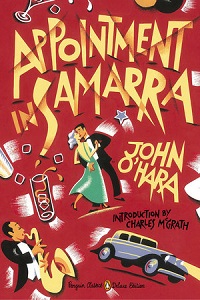
John ‘O Hara (31 januari 1905 – 11 april 1970)
Cover
De Amerikaanse schrijver Zane Grey werd geboren op 31 januari 1872 in Zanesville, Ohio. Zie ook alle tags voor Zane Grey op dit blog.
Uit: The Call of the Canyon
“What subtle strange message had come to her out of the West? Carley Burch laid the letter in her lap and gazed dreamily through the window.
It was a day typical of early April in New York, rather cold and gray, with steely sunlight. Spring breathed in the air, but the women passing along Fifty-seventh Street wore furs and wraps. She heard the distant clatter of an L train and then the hum of a motor car. A hurdy-gurdy jarred into the interval of quiet.
“Glenn has been gone over a year,” she mused, “three months over a year– and of all his strange letters this seems the strangest yet.”
She lived again, for the thousandth time, the last moments she had spent with him. It had been on New-Year’s Eve, 1918. They had called upon friends who were staying at the McAlpin, in a suite on the twenty-first floor overlooking Broadway. And when the last quarter hour of that eventful and tragic year began slowly to pass with the low swell of whistles and bells, Carley’s friends had discreetly left her alone with her lover, at the open window, to watch and hear the old year out, the new year in. Glenn Kilbourne had returned from France early that fall, shell-shocked and gassed, and otherwise incapacitated for service in the army–a wreck of his former sterling self and in many unaccountable ways a stranger to her. Cold, silent, haunted by something, he had made her miserable with his aloofness. But as the bells began to ring out the year that had been his ruin Glenn had drawn her close, tenderly, passionately, and yet strangely, too.
“Carley, look and listen!” he had whispered.
Under them stretched the great long white flare of Broadway, with its snow-covered length glittering under a myriad of electric lights. Sixth Avenue swerved away to the right, a less brilliant lane of blanched snow. The L trains crept along like huge fire-eyed serpents. The hum of the ceaseless moving line of motor cars drifted upward faintly, almost drowned in the rising clamor of the street. Broadway’s gay and thoughtless crowds surged to and fro, from that height merely a thick stream of black figures, like contending columns of ants on the march. And everywhere the monstrous electric signs flared up vivid in white and red and green; and dimmed and paled, only to flash up again.”
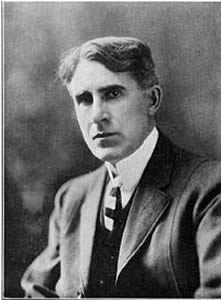
Zane Grey (31 januari 1872 – 23 oktober 1939)
De Nederlandse schrijver, dichter en dominee Anthony Winkler Prins werd geboren te Voorst op 31 januari 1817. Zie ook alle tags voor Anthony Winkler Prins op dit blog.
Onweder
De lucht is zwart, en sluit een enge kring
Van wolken om het aardrijk heen,
En pakt zich zwijgend meer en meer op één.
Geen enkel koeltje geeft verademing;
De noordewind, die afwaait van de zee,
Voert in zijn vlucht zelfs hitte en stiklucht mee.
Natuur is stil; – het lied der voglen zwijgt,
Slechts ’t rundvee loeit, versmachtend en verhit,
En ’t vurig ros, ontslagen van ’t gebit*,
Ligt nu op ’t gras aêmechtig* neer en hijgt.
De zee ruist dof, als zag de woeste vloed
Met schrik het eind der spanning te gemoet.
De nacht is daar, doch zie! een dubble nacht
Ontrolt zijn sluier plechtig over de aard:
Geheimvol dreigt het somber wolkgevaart,
Met bliksemschicht en donderbui bevracht.
De ganse lucht, de zee, het aardrijk, is
Een groot toneel van sombre duisternis.
Daar schiet op eens de felle bliksemschicht
De donkre wand der wolkenwoning door,
En land en zee vertoont zich in die gloor
Aan ’t oog, dat zich verheft bij ’t flikkrend licht:
Daar rolt op eens de doffe donder rond,
En de echo galmt in ’t dreunen van de grond.
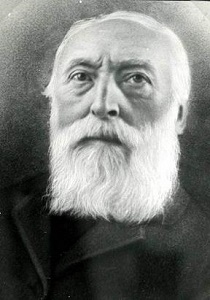
Anthony Winkler Prins (31 januari 1817 – 4 januari 1908)
De Vlaamse dichteres en schrijfster Maria Elisa Belpaire werd geboren te Antwerpen op 31 januari 1853. Zie ook alle tags voor Maria Elisa Belpaire op dit blog.
Twee liedekens in den zelfden trant
I.
Ik zat te bidden in de kerk –
Daar schoot een straal door de oude ramen
En lag, een tintlend kleurenwerk,
Op ’t koude marmer; en te zamen
Smolt purper, hemelsblauw en rood:
De matte vloer juweelen bood.
‘Ach!’ dacht in ’t binnenste mijn ziel,
‘Gij zijt dit marmer dof en koud
Waarop de rijke weerglans viel
Van levend purper, schittrend goud.
Gij zijt die nederige steen;
Maar ’s Heeren licht speelt om u heen.
O liefdeglans! O gratiegloed!
Herschep mijn leven koud en duister;
Werp op het marmer van ’t gemoed
Uw duizendkleurig licht en luister.
Daal neder, zonne, van omhoog;
Verblijd met kleurenglans het oog!
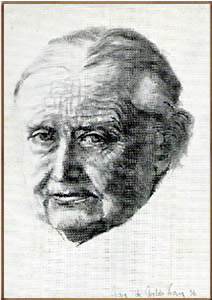
Maria Elisa Belpaire (31 januari 1853 – 9 juni 1948)
Portret door Kamiel Van de Velde, z.j.
De Amerikaanse schrijver (van Franse afkomst) Michel-Guillaume Jean de Crèvecoeur werd geboren op 31 januari 1735 in Caen. Zie ook alle tags voor Jean de Crèvecœur op dit blog.
Uit: Letters from an American Farmer
“Our minister took the letter from my wife, and read it to himself; he made us observe the two last phrases, and we weighed the contents to the best of our abilities. The conclusion we all drew, made me resolve at last to write.
You say you want nothing of me but what lies within the reach of my experience and knowl-edge; this I understand very well; the difficulty is, how to collect, digest, and arrange what I know? Next you assert, that writing letters is nothing more than talking on paper; which, I must confess, appeared to me quite a new thought. — ^Well then, observed our minister, neighbour James, as you can talk well, I am sure you must write tolerably well also; imagine, then, that Mr. F. B. is still here, and simply write down what you would say to him.
Suppose the questions he will put to you in his future letters to be asked by him viva voce, as we used to call it at the college; then let your answers be conceived and expressed exactly in
the same language as if he was present. This is all that he requires from you, and I am sure the task is not difficult. He is your friend : who would be ashamed to write to such a person?
Although he is a man of learning and taste, yet I am sure he will read your letters with pleasure : if they be not elegant, they will smell of the woods, and be a little wild ; I know your turn, they will contain some matters which he never knew before. Some people are so fond of novelty, that they will overlook many errors of language for the sake of information.
We are all apt to love and admire exotics, tho* they may be often inferior to what we possess; and that is the reason I imagine why so many persons are continually going to visit Italy. —
That country is the daily resort of modem travellers.”
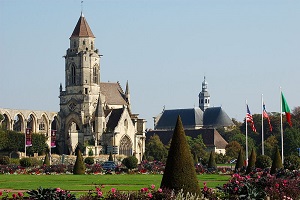
Jean de Crèvecœur ( 31 januari 1735 – 2 november 1813)
Caen, de kerken Saint-Étienne-le-Vieux en op de achtergrond Notre-Dame-de-la-Gloriette.
